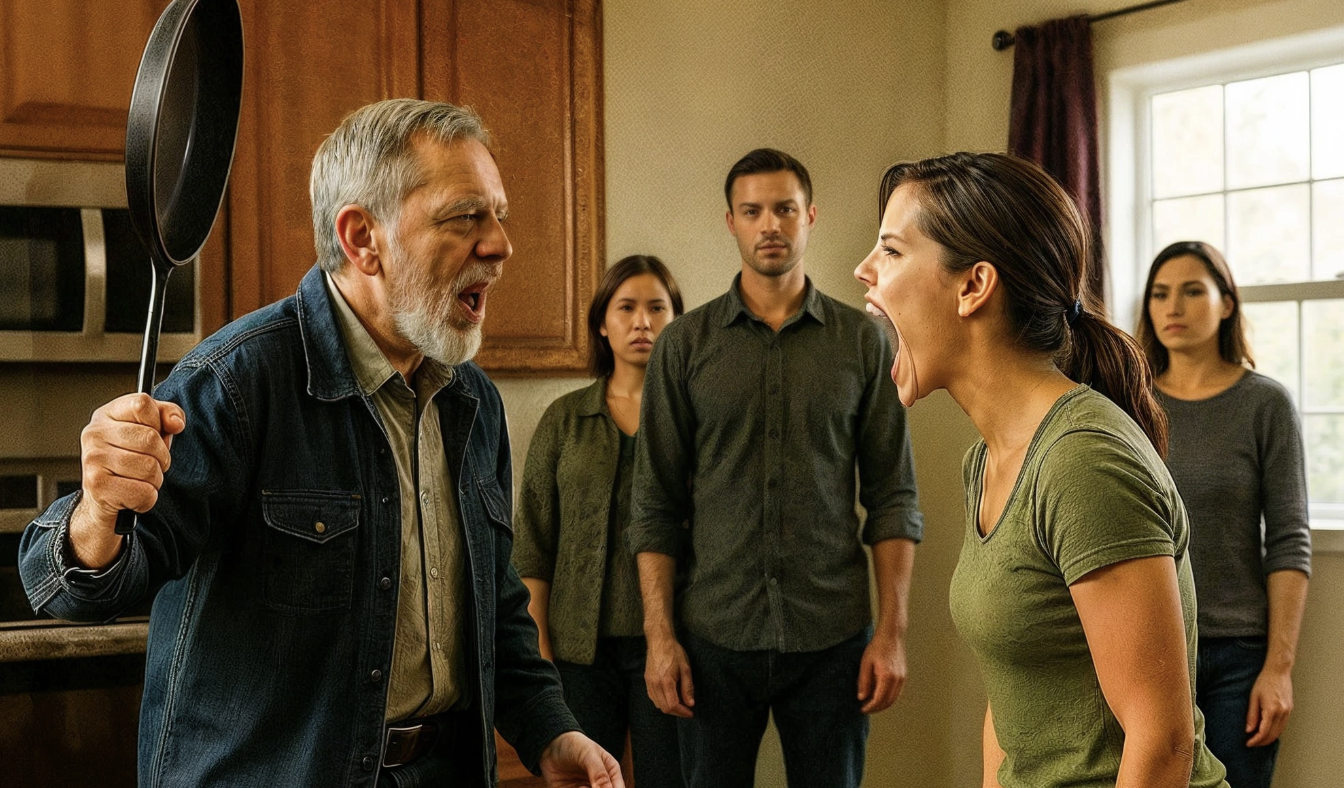The phone rang in the middle of dinner. The whole family was at the table—Katya with her husband Denis, his parents, and his younger sister Angela.
“Don’t answer,” the father-in-law grunted. “It’s rude to be on the phone at the table.”
But it rang again. Katya gave the relatives an apologetic look and picked up.
“Hello?”
“Good evening. This is Romanov & Partners, a law firm. Am I speaking with Ekaterina Vladimirovna?”
“Yes, that’s me.”
“We have a very important matter regarding an inheritance case. Would you be able to come to our office tomorrow?”
“What happened?”
“We don’t discuss this over the phone. I’ll only say this: it concerns a large sum.”
Katya set an appointment and hung up. Everyone stared at her with curiosity.
“Who was that?” her husband asked.
“Some lawyers. They’re talking about an inheritance.”
Her mother-in-law snorted.
“Inheritance! From whom, I wonder? Her parents weren’t wealthy.”
“Maybe some distant relatives,” Angela suggested.
“Yeah,” the father-in-law muttered. “Probably left her a tiny one-room apartment. Or some old dacha.”
Denis shrugged indifferently.
“Any money helps. Even ten thousand.”
Katya said nothing. For three years she hadn’t worked—she took care of the house and the household. The family didn’t have much money; they lived paycheck to paycheck.
After dinner, the father-in-law called his son into the kitchen. Katya was clearing the dishes and couldn’t help overhearing.
“Denis, you need to do something about your wife.”
“What’s wrong with her?”
“Third year she’s sitting at home. Not earning a penny, but she eats like everyone else.”
“Dad, she runs the house, cooks—”
“Anyone can cook and clean. Bringing money into the family—not everyone can.”
“There aren’t many jobs right now…”
“It’s not that there aren’t jobs—she just doesn’t want to! She’s gotten used to hanging off your neck!”
Denis sighed.
“I’ll talk to her.”
That evening he really did.
“Katya, maybe you should finally get a job?”
“You want me to work?”
“The family budget isn’t endless. Dad’s right—extra money wouldn’t hurt.”
“So I’m a burden?”
“Not a burden. But you’re not the breadwinner either.”
Those words stung, but Katya didn’t argue. In her husband’s family she already felt like an outsider.
The next day she went to the lawyers. At the office she was met by an elderly man in an expensive suit.
“Ekaterina Vladimirovna, have a seat. I have news for you that will change your life completely.”
“I’m listening.”
“Three days ago, businessman Alexei Romanov died in a car accident. Your uncle.”
“Uncle Alexei?” Katya was stunned. “But we haven’t spoken for fifteen years…”
“Nevertheless, he left a will. He bequeaths his entire estate to you.”
The lawyer opened a folder and took out documents.
“A retail chain, warehouse complexes, real estate, securities. The total value of the assets is eighty million rubles.”
Katya’s vision dimmed. Eighty million? It was impossible to imagine.
“Are you sure? Could it be a mistake?”
“No mistake. Here is the will, notarized. The only condition is that the money passes to you only after the testator’s death—which means now.”
“But why me? He had friends, business partners…”
The lawyer nodded to the text.
“The will says: ‘To my niece Ekaterina, the only one who never asked me for money and never fawned over me because of my wealth.’”
He handed her the documents.
“The money has already been transferred to your account. Tomorrow you may dispose of it as you see fit.”
Katya rode home as if in a fog. In her purse were the inheritance certificates; in her head there was only one thought—she was rich. Very rich.
At home the family was eating dinner. Everyone looked at Katya as she came in.
“Well? What kind of inheritance is it?” her mother-in-law asked.
“Uncle Alexei died. He left me his business.”
“What business?” Denis asked.
“A retail chain. And real estate.”
The father-in-law smirked.
“A retail chain! Probably a stall at the market. Or some little shop.”
“Not a stall,” Katya said quietly.
“Then what?”
“A chain of supermarkets.”
“How many stores?” Angela asked.
“Twenty-seven.”
Silence fell over the kitchen. The father-in-law was the first to recover.
“Twenty-seven stores? Are you out of your mind, girl—telling fairy tales!”
“Not fairy tales. Here are the documents.”
Katya laid the inheritance papers on the table. Denis picked them up, scanned them, and went pale.
“Eighty million rubles,” he read aloud.
The mother-in-law gasped and clutched her chest. Angela’s mouth fell open, but no sound came out.
And the father-in-law jumped up and shouted:
“You’re lying! Our freeloader can’t have that kind of money!”
“Dad, quiet,” Denis tried to calm him down.
“Quiet? No! She’s been hanging on my neck for three years, eating my bread, and now she’s making up stories about millions!”
“You can see the documents…”
“Forgery!” the father-in-law barked, grabbing a frying pan from the table. “Cursed parasite!”
He swung it and struck Katya on the head with all his strength. She collapsed; blood ran from her split eyebrow.
“Dad, what are you doing?!” Denis rushed to his wife.
“I’m doing what should’ve been done a long time ago! Kicking the loafer out of the house!”
The mother-in-law stared silently at her bleeding daughter-in-law. Angela backed toward the door. The father-in-law kept raging:
“How long are we supposed to tolerate this burden? Three years we feed her, clothe her, and she tells us fairy tales about millions!”
Denis helped Katya up and pressed a towel to her wound.
“Dad, calm down. Let’s sort this out peacefully.”
“Nothing to sort out! Tomorrow she packs her bags!”
“Where will I go?” Katya asked quietly.
“I don’t care! To the street, to friends, to your parents—just out of my house!”
At last the mother-in-law spoke:
“Maybe the documents are real? What if she really did inherit something?”
“Are you out of your mind?” the father-in-law snapped. “Look at her! A regular housewife! What kind of millionaire relatives do people like that have?”
“But the papers—”
“Fake! She probably borrowed money to get them made so she could stay in the family!”
Katya dabbed at the blood and stood up.
“Fine. I’ll leave in the morning.”
“Good,” the father-in-law grumbled. “Sick of you.”
That night Katya didn’t sleep. Her head hurt from the blow, but her soul hurt more. For three years she’d lived with these people, trying to be a good daughter-in-law—and they’d seen her as a moocher.
Denis shifted beside her.
“Katya… what if it’s true? About the inheritance?”
“It’s true.”
“Then why did Dad get so angry?”
“Because he’s been building up anger for three years. And now he poured it out.”
“He’s not mean. He’s just… tired of being broke.”
“And am I to blame there’s no money?”
“You’re not to blame. But you weren’t helping to earn either.”
Katya said nothing. In the morning she would call the bank and check the account. And then everyone would understand.
At seven a.m. the phone rang. It was the bank.
“Ekaterina Vladimirovna? A large transfer was deposited into your account yesterday. We wanted to confirm that everything is in order.”
“Yes, everything is fine. What amount was deposited?”
“Eighty million rubles. We are required to inform you about the tax obligations…”
“I understand. Thank you.”
Katya hung up. In the kitchen, the whole family was having breakfast.
“Who called?” Denis asked.
“The bank. They confirmed the money was deposited.”
The father-in-law snorted.
“Yeah, sure. And how much came in?”
“Eighty million.”
“Stop lying!” he roared.
“I’m not. If you want, call the bank yourself.”
Denis took his phone and found the bank’s number. After five minutes speaking with the operator, he slowly lowered the phone.
“Dad… it really is eighty million.”
“What?”
“The money is real. It came yesterday.”
The father-in-law grabbed the table to keep from falling. The mother-in-law opened her mouth, but couldn’t speak.
Angela was the first to react.
“Katya! Katyusha! Forgive us, idiots! We didn’t know!”
“Now you do.”
“Dad was just nervous! He’s exhausted from work!”
“I see.”
The father-in-law tried to say something, but Katya cut him off.
“I’ve already packed my bags. Like you demanded.”
“Katya, that’s nonsense!” the mother-in-law burst into tears. “Where will you go? This is your home!”
“Yesterday you said the opposite.”
“We just didn’t know about the money!”
“And if there was no money? Then it was okay to throw me out?”
The family fell silent. Her logic was ironclad.
Denis tried to hug her.
“Katya, forgive me. I was wrong.”
“Wrong about what?”
“About not standing up for you. About letting Dad hit you.”
“You did let him,” Katya agreed.
“But now everything will change! We’ll live differently!”
“Differently?”
“Well, yes! We have money now!”
Katya gave a bitter smile.
“I have money. And you still have your debts.”
“How is that?” the father-in-law didn’t understand.
“Like this. The inheritance is mine. None of it is yours.”
“But we’re family!”
“Yesterday we were family. Today I’m rich, so suddenly everything changes.”
The mother-in-law rushed toward her.
“My dear girl, don’t say that! We love you!”
“You loved me yesterday, when you thought I was poor?”
“We loved you! We just… we just didn’t show it!”
“You didn’t show it. But you showed what you really think.”
Katya took her suitcases.
“Goodbye. Thank you for your hospitality.”
“Katya, stop!” the father-in-law shouted. “I apologize! Forgive me, old fool!”
“It’s too late to apologize.”
“Not too late! I’ll crawl on my knees!”
“Don’t. Just live the way you lived before.”
“Like before?”
“Without the freeloader who eats your bread.”
She left the apartment to the screams and pleas of her relatives. Denis caught up to her by the elevator.
“Katya, don’t go! Think about our marriage!”
“I’ve been thinking for three years.”
“Thinking about what?”
“About why I need a husband who can’t protect his wife.”
“I will protect you! No one will touch you again!”
“Yesterday you didn’t.”
“I froze…”
“And I got disappointed.”
The elevator arrived. Katya stepped in. Denis tried to follow.
“Katya, wait! Let’s talk calmly!”
“There’s nothing to talk about. Yesterday you said everything.”
The elevator doors closed. Downstairs, a taxi was waiting.
A month later Katya bought herself a house in an elite gated cottage community. She built a new life without reproaches, humiliation, and frying-pan blows.
And her former family beat their heads against the wall. Eighty million rubles were gone forever—all because of one uncontrolled outburst of rage and an unwillingness to believe in the success of someone close.
For another six months Denis tried to reconcile—he wrote, called, came by. Useless. Katya was polite but unyielding.
“But there was love!” he shouted.
“There was,” Katya agreed. “On my side. On your side there was a habit.”
“What habit?”
“The habit of thinking of me as a failure. A burden. A parasite.”
“We didn’t think that!”
“Your father said it outright yesterday. And you stayed silent.”
Denis fell quiet. There was nothing to argue.
A year later Katya finalized the divorce. She left her ex-husband their old apartment—let him keep living with his parents.
And she opened a charitable foundation to help women who had suffered domestic violence. From her own experience, she knew how painful and humiliating it was.
The foundation quickly became well known. Katya didn’t skimp on help—she paid for housing for survivors, covered medical treatment, helped with employment.
Journalists often asked why she chose that direction.
“Because I know what it feels like to get hit in the head with a frying pan by the people closest to you,” she answered calmly.
“But your offenders have understood their mistake…”
“They understood only after they learned about the money. And if there had been no money?”
That question left people speechless.
Meanwhile, the ex-family lived in poverty. The father-in-law lost his job—management found out how he treated his rich daughter-in-law and decided they didn’t want to deal with someone like that.
Denis lost his position too. Colleagues stopped respecting him after the story about the eighty million spread.
The mother-in-law fell ill from the stress. There was no money for treatment—the family was barely making ends meet.
Angela was the only one who tried to find work and somehow improve their situation. But there was no easy money.
Two years later the father-in-law couldn’t take it anymore. He came to his former daughter-in-law to ask forgiveness.
Katya received him in her office. The elderly man looked pathetic—thin, in worn clothes, with dull eyes.
“Katya… Ekaterina Vladimirovna… forgive me, old fool.”
“What are you asking forgiveness for?”
“For everything. For hitting you. For throwing you out. For calling you a parasite.”
“And why did you call me a parasite?”
“Because… because you didn’t earn money.”
“And what’s changed now?”
“Now I understand—it’s not about money. It’s about the person.”
Katya looked at him carefully.
“You realized that rather late.”
“Late, yes. But maybe it’s not hopeless yet?”
“What do you want?”
“I want you to forgive me. And for the family to be together again.”
“Family?”
“Yes. You’re Denis’s wife. My daughter-in-law.”
“Ex-wife. Ex-daughter-in-law.”
The father-in-law was silent for a moment, then asked:
“And you won’t give us any money? Things are really bad.”
Katya smirked.
“So that’s the truth. You didn’t come to make peace—you came to ask for money.”
“Not only money! I want reconciliation too!”
“Reconciliation for money?”
“Well… family, after all…”
“There is no family between us. And there won’t be.”
The father-in-law left empty-handed. A month later Katya learned he was telling everyone how greedy and spiteful she was.
“She’s got eighty million, and she won’t give her relatives a kopeck!” he complained to neighbors.
“What relatives?” people asked.
“What do you mean—what relatives? Father-in-law, mother-in-law, husband!”
“But she divorced you…”
“Formally divorced! But in essence—we’re family!”
People found such logic astonishing, but the father-in-law sincerely believed he was right.
Meanwhile, Katya met another man—Alexei, a doctor from a hospital her foundation sponsored.
He didn’t know about her wealth. They met in ordinary circumstances and fell in love without calculation.
Only after six months together did Katya tell him the truth. Alexei listened and said:
“I understand why you hid it. After something like that it’s hard to trust anyone.”
“And how do you feel about money?”
“Calmly. If it’s there—great. If not—not a tragedy.”
“Really?”
“Really. What matters is the person beside you, not the size of their wallet.”
For the first time in a long time Katya felt she could relax. Not fear judgment, not expect a catch, not check every word for sincerity.
A year later they got married—quietly, without extravagance. Only their closest friends were at the wedding.
Her ex-husband learned about it from the newspapers. The article was titled: “Millionairess Marries a Simple Doctor.”
Denis stared at the photos of the happy couple for a long time, then said to his parents:
“That could have been us.”
“If it weren’t for Dad’s frying pan,” Angela added.
The father-in-law said nothing. He had nothing left to say.
And Katya built a new life—honest, open, based on mutual respect. For the first time in many years, she was truly happy.
Sometimes she remembered that evening and the blow from the frying pan—and thought how good it was that everything happened exactly like that. The удар (blow) opened her eyes to the true nature of the people she had called family.
And her real family turned out to be completely different. There no one kept score of who earned how much. There they didn’t love for money—they loved simply because.



